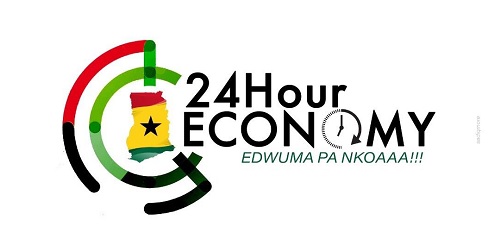Ghana’s ambition to become a 24-hour economy reflects an urgent response to persistent unemployment, underutilised public assets, and bottlenecks in service delivery. Under the leadership of President John Dramani Mahama, the National Democratic Congress has “pledged to transform Ghana into a 24-hour economy,” a commitment designed to unlock inclusive growth and improve quality of life for citizens across all regions.
Globally, economies operating beyond the traditional 8 a.m. to 5 p.m. window enjoy higher output, greater employment absorption, and more efficient public services. In Ghana, members of the workforce and everyday citizens face congested queues at critical public agencies and unmet demand for essential services. By extending operational hours, the nation stands to maximise utilisation of buildings, equipment, and skilled personnel, while generating new demand in transportation, energy, retail, and hospitality sectors. These anticipated gains lay the foundation for a sustained, productivity-driven transformation of the national economy.
The most credible demonstration of a 24-hour paradigm begins within government-managed institutions, where centralised control can ensure coherent policy direction. Priority deployment in healthcare facilities—hospitals, polyclinics, and emergency centres—allows Ghana to build upon existing round-the-clock operations. Similarly, higher-education campuses, technical schools, and public libraries can extend evening and weekend hours to cater to adult learners and research initiatives. Administrative agencies that routinely face long queues—such as the Passport Office, Births and Deaths Registry, Ghana Immigration Service, DVLA, and the Registrar General’s Department—can pilot extended shift models to reduce delays and bolster citizen satisfaction. Through these early benchmarks, the public sector sets a clear example for the wider economy to follow.

Transitioning to nonstop operations warrants careful calibration of shift structures. Rather than immediately adopting three full eight-hour rotations, the phased model proposes an initial two-shift arrangement: a day shift from 7 a.m. to 3 p.m. and an evening shift from 3 p.m. to 10 p.m.
This intermediate step helps institutions and the public adjust gradually, while mitigating overnight utility costs and security risks. Over time, agencies demonstrating sustained demand and operational readiness can migrate to a full three-shift, 24-hour service cycle, ensuring scalability without overburdening staff or infrastructure.
Expanding public service hours necessitates a concerted effort in workforce planning. The government must engage labour unions to review wage structures, shift allowances, and health and safety protocols, ensuring fair compensation for non-standard hours. Human-resource departments will need to develop transparent rosters that balance employee well-being with operational requirements. Concurrently, collaborations with training institutions can establish pipelines of skilled recruits, while targeted incentives such as tax reliefs or subsidies, encourage private-sector entities to adopt similar extended-hours models. This holistic labour framework underpins both public confidence and staff morale throughout the implementation phase.
Infrastructure upgrades are critical companions to policy roll-out. Reliable electricity supply, enhanced street lighting in urban and peri-urban areas, and expanded public‐transport services ensure safety and accessibility during extended hours. Strengthening nighttime security presence deters crime and supports uninterrupted economic activity. By prioritising these investments, Ghana can address foundational constraints and foster an enabling environment for round-the-clock operations in both public and private sectors.
Digitalisation offers a powerful lever to sustain 24-hour service delivery. Ensuring uninterrupted online access to key public services—such as passport applications, tax filings, and business registrations—reduces physical congestion and empowers citizens to transact after traditional hours. Integrating e-payment platforms enhances convenience and security, while real-time data analytics enable government agencies to monitor demand patterns, service quality, and user feedback continuously. These digital tools not only support extended schedules but also sharpen accountability and resource allocation across ministries and departments.
While the public sector leads the initial push, private enterprises across manufacturing, retail, banking, logistics, and hospitality must be mobilised to capitalise on extended operating hours. The government can foster their participation through flexible labour laws, tax incentives, and

partnerships that align service delivery with public institutions at night. Equally crucial is the inclusion of informal actors—market vendors, transport operators, and small traders—whose livelihoods stand to benefit from safer, better-lit commercial zones. Providing them with access to infrastructure improvements, sanitation services, and security support ensures no stakeholder is left behind in the transition to a continuous economy.
Sustaining momentum for a 24-hour economy requires nationwide engagement. A coordinated public campaign must articulate the benefits of extended service hours, inform citizens of new access channels, and clarify worker rights under the emerging shift framework. By involving community leaders, civil-society organisations, and media outlets, government authorities can foster inclusive dialogue and social acceptance. Clear communication mitigates resistance to change and galvanises collective ownership of the 24-hour vision.
Strategically extending Ghana’s operational hours beyond daylight presents a powerful opportunity to tackle unemployment, optimise public assets, and modernise service delivery. A phased, public sector-led approach provides a disciplined, replicable model that builds credibility, tests readiness, and calibrates labour and infrastructure requirements. With robust digital platforms and proactive engagement of both formal and informal private sectors, Ghana can shepherd a seamless transition to a genuinely 24-hour economy. The success of this transformation hinges on sustained political commitment, cross-sector collaboration, and continuous citizen involvement—ensuring that nonstop productivity translates into shared prosperity for all Ghanaians.



